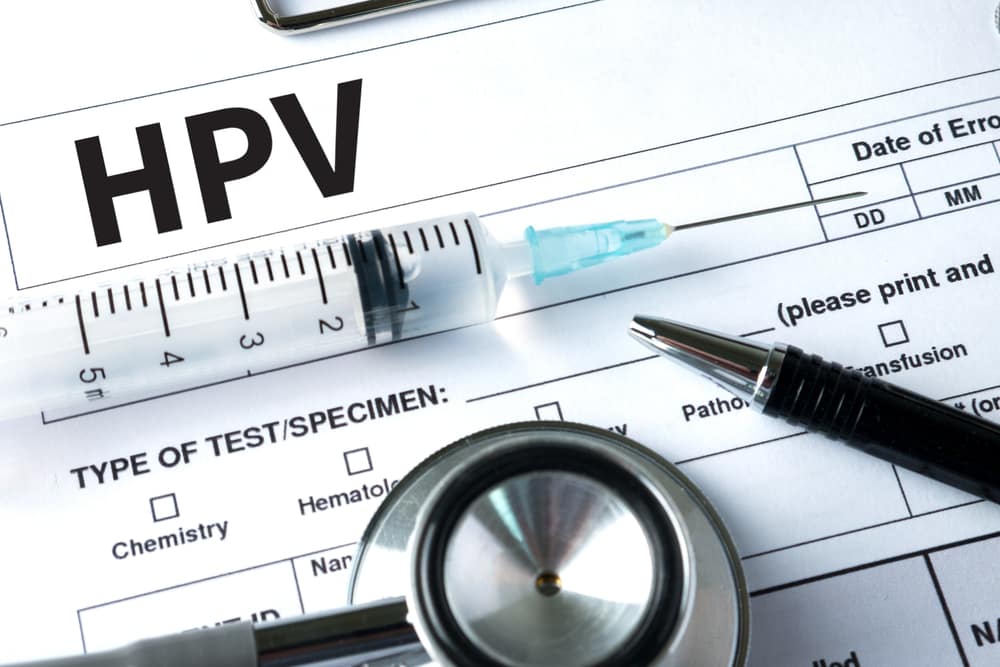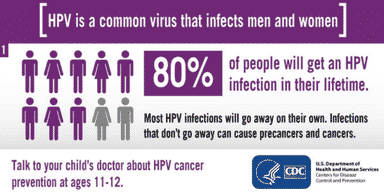
In 2006, a vaccination was made available that prevents cancer. It’s remarkable when you think about it like that. Wouldn’t you want to prevent cancer? This vaccination was the Quadraivalent HPV Vaccination that protects young adults against HPV Types 6, 11, 16, and 18. In 2014 the vaccination was updated to the 9-Valent HPV Vaccination that protects against 9 genotypes of the virus.
So what is HPV? HPV is a virus that is transmitted through sexual contact. Most HPV infections go away by themselves within 2 years. But sometimes the HPV infection will last longer and can cause certain cancers and other diseases. HPV is a virus that can cause cancer of the cervix, vagina, vulva, penis, throat and tongue. It is also a cause of genital warts. One in four people have HPV but it often doesn’t have any symptoms. Since there are no obvious signs of infection, it is easily spread and may only take one sexual encounter to become infected.
Does this vaccine really work? According to the CDC, clinical trials show that the vaccine provides close to 100% protection against cervical pre-cancers and genital warts. There has been a 64% reduction in HPV type infections among teen girls since the vaccine came out in 2006. The 9-Valent Vaccine has been shown to reduce cervical, vulvar, and vaginal cancer as well as penile cancers and warts at a greater than 99% rate.
Is the HPV vaccination safe? The United Sates currently has the safest, most effective vaccine supply in history. The CDC and FDA closely monitor any associated side effects/adverse events through the Vaccine Adverse Event Reporting System. All of the HPV vaccinations went through safety testing and clinical trials. There have been more than 60 million doses of HPV vaccine distributed since 2006 and there is no data to suggest that there are any severe adverse reactions linked to the vaccination. There are potential side effects but they are minimal and the same as many other vaccinations. The most common side effects are redness, swelling around the area and soreness that is temporary and will pass on their own without any treatment. Brief fainting can happen after any medical procedure including vaccinations. Your provider administering the vaccine may recommend staying 15 minutes after administration to prevent fainting.
Who should get the HPV vaccination? The recommendation is for girls and boys at the age of 11-12 as part of the adolescent immunization platform to help reduce the incidences of HPV infection. This group is more likely to complete the vaccination series versus an older teen thereby giving the child full protection against HPV. The vaccination is most effective in those who have not been sexually active, although the vaccination is recommended regardless of prior exposure to HPV. It can be started at age 9 and through age 26. It is recommended to have two doses at least six months apart.
What are you going to do? I’ve been asked by many fellow mothers about this vaccination. My children are younger so I hadn’t thought about it from a mother’s perspective until now. When I see statics like: 50% of new HPV infections occur in 15-24 year olds, my conclusion is that I will vaccinate my boys and daughter at the recommended age. The evidence based medicine is solid and supports the recommendation.
Renee Alwan Percell, MMS, PA-C

